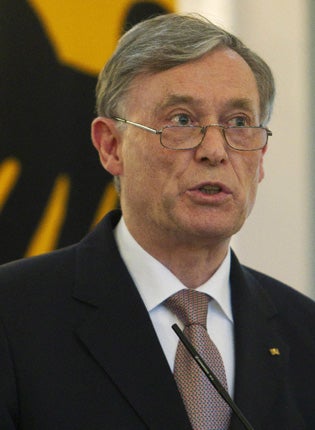President of Germany forced to quit after Afghan 'gaffe'
Köhler accused of violating constitution after suggesting troops were protecting economic interests. Tony Paterson reports

Germany's conservative President Horst Köhler tendered his immediate resignation yesterday after he was criticised for remarks that seemed to suggest his country's troops were in Afghanistan to protect German economic interests.
The President, who is a member of Chancellor Angela Merkel's governing Christian Democrats, said he was stepping down at once from the largely ceremonial office in what seemed to be a fit of pique.
Television showed Mr Köhler, 67, in Berlin's Bellevue presidential palace with his wife, Eva Luise. The President had tears in his eyes as he announced his decision to resign after holding office for six years. "It was an honour for me to serve Germany," he said.
He flatly denied that he had linked his country's military presence in Afghanistan with safeguarding Germany's economic interests. "These allegations are completely without justification," he said. "I have not been shown the respect due to me as the holder of the highest office of state."
Mr Köhler's abrupt departure was almost certain to further inflame the controversy already raging in Germany over the country's highly unpopular Afghanistan mission, which is opposed by at least 60 per cent of the population. The issue will add to the growing list of political, monetary and economic woes faced by Ms Merkel's ailing coalition government.
The German Chancellor described the resignation as a serious blow to her government. Ms Merkel frequently consulted Mr Köhler, a former head of the International Monetary Fund, over the euro crisis. "I tried to get him to change his mind, but this was not possible. Many people will be sad to see him go," she said.
The row erupted 10 days ago after the President made a brief visit to the German army's 4,500-strong contingent of troops in Afghanistan. On his return Mr Köhler gave an interview in which he reiterated his government's line that Germany was in Afghanistan to provide the country with security and that it was right and proper for the issue to be discussed.
However he went on to add: "A country of our size, with its dependence on foreign trade, has to be aware that in cases of emergency military deployment it is also necessary to protect our interests... for example free trade routes."
His remarks were immediately interpreted as a radical departure from the government's line on Afghanistan which insists that Bundeswehr troops are there to protect German citizens at home from attacks by Islamic terrorist groups. Mr Köhler complained that he had been misunderstood. A spokesman for his office said that his remarks referred to the German navy's role in combating international piracy and that no link with Afghanistan had been intended.
But politicians from all of Germany's main opposition parties accused the President of violating the constitution by approving a military mission designed to safeguard German economic interests.
Thomas Opperman, the parliamentary leader of the opposition Social Democrats, accused Mr Köhler of eroding the public's patchy acceptance of the German army's Afghanistan mission. "We are not fighting a war for economic interests; it is about our security," he insisted.
Klaus Ernst, a senior MP in Germany's former communist Left Party, said Mr Köhler had laid bare the "truth" that "German soldiers are risking their health and their lives for the export quotas of huge companies". Several editorial writers accused the President of using "gunboat diplomacy".
Mr Köhler's shock decision could hardly have come at a worse time for Ms Merkel's government of conservatives and liberal Free Democrats. Her coalition is suffering its lowest popularity rating in four years, largely as a result of its perceived mismanagement of the euro crisis.
Afghanistan remains a highly sensitive issue. Public opposition to the German mission has grown as increasing numbers of Bundeswehr troops have been killed or injured in action in their deployment area in the northern Kundus province that was once regarded as comparatively peaceful. Last year the German army's role in directing an air strike on a hijacked tanker lorry that killed dozens of civilians prompted a clamour of calls for a complete German withdrawal.
In response to allegations that politicians were deliberately playing down or ignoring the war to placate public opinion, Ms Merkel last year appointed the popular conservative politician Karl Theodor zu Gutenberg as Defence Minister. One of his main contributions has been to use the hitherto taboo word "war" rather than "peace-keeping mission" when talking about Afghanistan.
The government announced yesterday that Jens Börnsen, the Social Democrat Speaker of Germany's upper house, the Bundesrat, would act as interim President.
Join our commenting forum
Join thought-provoking conversations, follow other Independent readers and see their replies
Comments